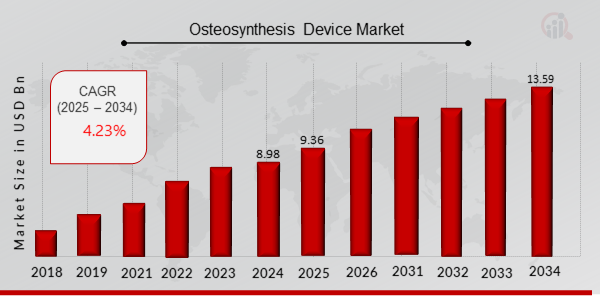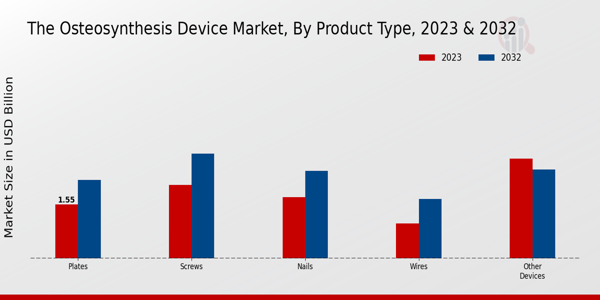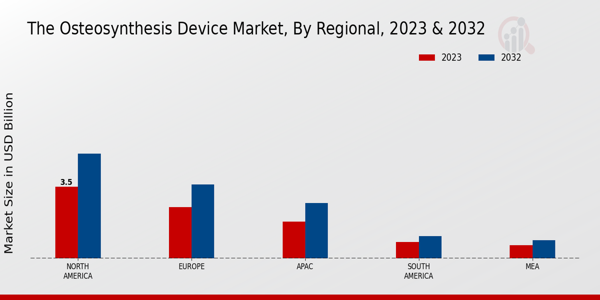Global Osteosynthesis Device Market Overview
As per MRFR analysis, the Osteosynthesis Device Market Size was estimated at 8.98 (USD Billion) in 2024. The Osteosynthesis Device Market Industry is expected to grow from 9.36 (USD Billion) in 2025 to 13.59 (USD Billion) till 2034, at a CAGR (growth rate) is expected to be around 4.23% during the forecast period (2025 - 2034).
Key Osteosynthesis Device Market Trends Highlighted
The Global Osteosynthesis Device Market is doing well and is being driven by several factors, like treating the growing number of orthopaedic injuries and the elderly population. Increased sexual activity leads to fractures and other bone injuries, which prompts a need for treatment solutions. Furthermore, many advanced technologies are being developed, such as those that allow devices to be less invasive, which increases the safety and efficiency of operations. A rise in healthcare spending and focus on improving a patient's health and well-being are also some of the factors that promote the growth of the market.
Several opportunities are up for grabs in Osteosynthesis Device Market.
Advancements in healthcare infrastructure in developing countries can lead to increased utilization of advanced surgical devices. Research and development conducted by manufacturers to create new products and methodologies provide an opportunity for an increased market share. At the same time, combining smart technology with classical devices creates completely new niches, meeting the needs of patients and doctors. An increasing trend in the market is directed towards less invasive medical procedures as well as better attitudes towards patients. Osteosynthesis devices have been increasingly embraced by surgeons in attempts to enhance patient recovery and comfort.
Moreover, there is a growing focus on bio-compatible materials that promote faster healing and reduce the risk of post-operative complications. Collaboration between medical device companies and healthcare providers is becoming more common, leading to improved product design and functionality. This collaboration, along with a heightened awareness of orthopedic health, is reinforcing the momentum of Osteosynthesis Device Market as it adapts to changing healthcare landscapes.

Source: Primary Research, Secondary Research, Market Research Future Database and Analyst Review
Osteosynthesis Device Market Drivers
Increasing prevalence of orthopedic disorders
The rising incidence of orthopedic conditions is a significant driver for the Global Osteosynthesis Device Market Industry. As the global population ages, the prevalence of conditions such as fractures, deformities, and degenerative joint diseases is increasing. This rise in orthopedic disorders leads to a greater demand for osteosynthesis devices, which are utilized in surgical procedures to stabilize bone fractures and ensure proper healing.Moreover, the growing number of accidents and injuries, along with a proactive approach toward health and wellness, further contributes to an uptick in orthopedic surgeries.
Hospitals and surgical centers are witnessing an influx of patients requiring sophisticated orthopedic solutions, which further bolsters investment and innovation in osteosynthesis technology. As healthcare systems globally continue to adapt to evolving patient needs, the demand for durable, reliable, and technologically advanced osteosynthesis devices is expected to grow significantly.Innovations such as bioabsorbable materials and advanced fixation techniques are gaining traction within the Global Osteosynthesis Device Market Industry, thereby transforming treatment options for orthopedic conditions and expanding their availability to a broader demographic.
In this context, as more clinicians and patients recognize the benefits of these devices for successful surgical outcomes, there will be continual growth for market players involved in the design and manufacturing of osteosynthesis solutions.
Technological advancements
Technological advancements in the field of osteosynthesis devices are driving significant growth within the Global Osteosynthesis Device Market Industry. With ongoing research and development efforts, manufacturers are introducing innovative products that improve surgical outcomes, reduce recovery times, and enhance patient safety. For example, the advent of minimally invasive surgical techniques and 3D printing technology has paved the way for customized implants and fixation devices tailored to individual patient needs.Additionally, advancements in materials science have led to the development of lightweight and stronger materials that provide better fixation and stability during the healing process.
These technological innovations not only enhance the functionality of osteosynthesis devices but also expand their applications across various orthopedic procedures, contributing to the overall growth of the market. As healthcare providers increasingly adopt these cutting-edge solutions, the Global Osteosynthesis Device Market Industry is likely to experience accelerated expansion.
Growing geriatric population
The global geriatric population is on the rise, significantly impacting the Global Osteosynthesis Device Market Industry. As individuals age, they are more susceptible to fractures and orthopedic conditions, leading to increased demand for osteosynthesis devices for surgical interventions. The aging population is expected to result in a higher number of orthopedic surgeries, thus propelling the growth of Osteosynthesis Device Market. To cater to this demographic shift, healthcare providers are investing in advanced treatment options and technologies to improve patient outcomes.
Osteosynthesis Device Market Segment Insights
Osteosynthesis Device Market Product Type Insights
The Global Osteosynthesis Device Market is segmented into various Product Types, showcasing a diverse range of devices utilized for orthopedic surgery. In 2023, the market was valued at 8.26 USD Billion and was poised for growth, driven by increasing incidences of road accidents, sports injuries, and an aging population requiring orthopedic surgeries. Each product type exhibits distinct valuation trends within this market landscape.
In particular, Plates are valued at 1.55 USD Billion, demonstrating their essential role in stabilizing and fixing bone fractures.This segment is important as plates are often used in complex fracture cases, making them a preferred choice for many orthopedic surgeons.
Screws follow closely, valued at 2.1 USD Billion in 2023, reinforcing their prominence for securing fractures across different bone types. Their design innovations continue to improve fixation strength, thus enhancing their demand in surgical procedures. The Nails segment, valued at 1.75 USD Billion, is also noteworthy because they provide excellent stability for fractures in long bones, contributing significantly to the overall market growth.Wires, valued at 1.0 USD Billion, are particularly relevant in smaller bone surgeries and are extensively used in fixation techniques. Although this segment is the least valued, it provides significant contributions to minimally invasive procedures.
Additionally, Other Devices, accounting for 2.86 USD Billion in 2023, encompass a variety of osteosynthesis tools that do not fit into the other categories, highlighting the market's versatility. Interestingly, the valuation for Other Devices is expected to decline slightly by 2032, indicating a transitioning focus towards more specialized systems such as plates and screws.The distinct needs of various surgical procedures ensure the sustained relevance of all these Product Types within the Global Osteosynthesis Device Market, revealing a landscape characterized by innovation, improved surgical outcomes, and a commitment to facilitating effective orthopedic care.

Source: Primary Research, Secondary Research, Market Research Future Database and Analyst Review
Osteosynthesis Device Market Material Insights
The Global Osteosynthesis Device Market, specifically focusing on the Material segment, has shown substantial growth, with a market valuation expected to reach 8.26 USD Billion in 2023. The composition of this segment includes various materials such as Metal, Bio-resorbable, Ceramic, and Polymer, each playing a crucial role in the overall market dynamics. Metal remains a significant contributor, revered for its durability and strength, making it a preferred choice in many orthopedic applications.
Bio-resorbable materials are gaining traction as they offer the advantage of gradual degradation in the body, potentially reducing the need for additional surgeries.Ceramics, known for their biocompatibility and aesthetic benefits, are often used in dental and orthopedic procedures, further enhancing their relevance in the market. Polymer materials are extensively utilized due to their versatility and ease of fabrication, catering to a wide range of applications in osteosynthesis devices. The Global Osteosynthesis Device Market statistics reflect these trends where growth drivers such as technological advancements and increased orthopedic surgeries bolster the prominence of these materials.
However, challenges like the high costs associated with some advanced materials might impede growth.Despite this, the opportunities for innovation, particularly in bio-resorbable technologies, continue to expand, indicating a dynamic market environment.
Osteosynthesis Device Market Application Insights
The Global Osteosynthesis Device Market experienced notable growth, with a valuation of 8.26 USD Billion in 2023. The application segment encompasses a variety of fields, such as Orthopedic Surgery, Trauma Surgery, Sports Medicine, and Craniomaxillofacial Surgery, each playing a crucial role in the market's dynamics. Orthopedic Surgery holds a significant portion of the market, driven by an increasing prevalence of bone-related disorders and a growing aging population.
Trauma Surgery is vital due to the rising incidence of accidents, contributing extensively to the demand for osteosynthesis devices.Sports Medicine is emerging as a key area, spurred by rising sports activities and injuries, while Craniomaxillofacial Surgery is gaining importance due to advancements in minimally invasive techniques and aesthetic procedures. The intricacies and requirements of each application emphasize the market's diversity and complexity, which is pivotal for understanding Global Osteosynthesis Device Market revenue trends and performance. These factors collectively highlight the vital role of application categories in shaping the overall Global Osteosynthesis Device Market statistics and growth trajectory.
Osteosynthesis Device Market End User Insights
The End User segment of the Global Osteosynthesis Device Market is witnessing notable traction, contributing significantly to the overall market dynamics, which is expected to reach a valuation of 8.26 USD Billion in 2023. This segment is characterized by various key players, prominently including Hospitals, Ambulatory Surgery Centers, and Orthopedic Clinics, each playing an essential role in healthcare delivery.
Hospitals dominate this market primarily because they cater to a vast patient base requiring osteosynthesis procedures, thus driving substantial revenue within this segment.Ambulatory Surgery Centers are also increasing in importance as they provide cost-effective and efficient surgical options, attracting more patients seeking convenience and quicker recovery times. Meanwhile, Orthopedic Clinics continue to play a critical role in specialized care, focusing strictly on musculoskeletal conditions, thereby catering to a niche that often requires advanced osteosynthesis solutions.
The continual advancements in surgical techniques and device technology, along with the surging incidence of orthopedic injuries, are expected to spur the demand across these facilities.However, challenges such as high costs and competition among various healthcare settings may impact growth. The insights into the Global Osteosynthesis Device Market data portray a diverse picture of an industry adapting to meet evolving health needs.
Osteosynthesis Device Market Regional Insights
The Global Osteosynthesis Device Market is experiencing steady growth across its regional segmentation, with North America leading the market. In 2023, North America was valued at 3.5 USD Billion, reflecting its majority holding due to advanced healthcare infrastructure and significant surgical procedures. Europe followed, valued at 2.5 USD Billion, benefiting from its large population and increased incidence of orthopedic conditions.
The APAC region, with a valuation of 1.8 USD Billion, is gaining significance due to rising healthcare investments and a growing elderly population.South America and MEA, valued at 0.8 USD Billion and 0.66 USD Billion in 2023, respectively, represent emerging markets with expanding healthcare facilities and improving economic conditions, though they remain less dominant compared to the larger regions. Overall, these dynamics highlight the Osteosynthesis Device Market's varied landscape, revealing opportunities driven by regional trends and advancements in technology.

Source: Primary Research, Secondary Research, Market Research Future Database and Analyst Review
Osteosynthesis Device Market Key Players and Competitive Insights
The Global Osteosynthesis Device Market is characterized by a competitive landscape that encompasses a variety of players firmly positioned across different segments of the industry. Companies are increasingly focusing on innovation and technological advancements to gain competitive advantages and enhance their market presence. The market dynamics are influenced by factors such as the rising incidence of orthopedic surgeries, the growing geriatric population, and advancements in medical technologies. Competitive strategies such as mergers, acquisitions, and collaborations are prominent as companies aim to expand their product portfolios and geographic reach.
Additionally, regulatory compliance and quality certifications are critical as they influence the acceptance of osteosynthesis devices in various regions. The ongoing research and development initiatives aimed at improving existing products and developing new solutions are pivotal in shaping the future of this market.Amedica Corporation stands out in the Global Osteosynthesis Device Market due to its focus on developing and marketing innovative spinal and orthopedic implant products. The company leverages its proprietary technology and materials science expertise to create devices that are not only durable but also demonstrate enhanced bioactivity.
This strength enables Amedica Corporation to address specific niche markets within osteosynthesis, catering to a range of surgical applications. Their commitment to product development and high-quality manufacturing processes supports their competitive position, allowing them to meet the evolving demands of healthcare providers and patients alike.
This technical prowess, coupled with a customer-centric approach, reinforces Amedica's standing within the market, making it a notable player amid increasing competition.Arthrex is another key player in the Global Osteosynthesis Device Market, distinguished by its vast portfolio of innovative surgical products and solutions. Known for its focus on minimally invasive surgical techniques, Arthrex has established itself as a leader in orthopedic surgical devices. The company invests heavily in research and development, which enables the continuous introduction of state-of-the-art products that address the needs of orthopedic surgeons and their patients.
Its strong global network of distribution partners and emphasis on providing comprehensive training and support to healthcare professionals further bolster its competitive advantages. Arthrex's commitment to quality, safety, and clinical effectiveness ensures that it maintains a significant presence in Osteosynthesis Device Market, driving both growth and market share expansion.
Key Companies in Osteosynthesis Device Market Include
Osteosynthesis Device Market Industry Developments
-
Q1 2024: Stryker launches Gamma4 Hip Fracture Nailing System in Europe In March 2024, Stryker announced the launch of its Gamma4 Hip Fracture Nailing System in Europe, expanding its portfolio of osteosynthesis devices for hip fracture management.
Osteosynthesis Device Market Segmentation Insights
Osteosynthesis Device Market Product Type Outlook
Osteosynthesis Device Market Material Outlook
Osteosynthesis Device Market Application Outlook
-
- Craniomaxillofacial Surgery
Osteosynthesis Device Market End User Outlook
-
- Ambulatory Surgery Centers
Osteosynthesis Device Market Regional Outlook
| Report Attribute/Metric |
Details |
|
Market Size 2024
|
8.98 (USD Billion)
|
|
Market Size 2025
|
9.36 (USD Billion)
|
|
Market Size 2034
|
13.59 (USD Billion)
|
|
Compound Annual Growth Rate (CAGR)
|
4.23 % (2025 - 2034)
|
|
Report Coverage
|
Revenue Forecast, Competitive Landscape, Growth Factors, and Trends
|
|
Base Year
|
2024
|
|
Market Forecast Period
|
2025 - 2034
|
|
Historical Data
|
2020 - 2024
|
| Market Forecast Units |
USD Billion |
| Key Companies Profiled |
Amedica Corporation, Arthrex, MacroPore, Smith and Nephew, Stryker Corporation, DePuy Synthes, Stryker Instruments, Cook Medical, B. Braun Melsungen, NuVasive, Wright Medical Group, Zimmer Biomet, Medtronic, Johnson and Johnson, Orthofix Medical |
| Segments Covered |
Product Type, Material, Application, End User, Regional |
| Key Market Opportunities |
Increasing geriatric population, Rising sports injuries, Advancements in minimally invasive techniques, Growing demand for bio-compatible materials, Expansion in emerging markets |
| Key Market Dynamics |
technological advancements, increasing geriatric population, rising sports injuries, growing demand for minimally invasive surgeries, favorable reimbursement policies |
| Countries Covered |
North America, Europe, APAC, South America, MEA |
Frequently Asked Questions (FAQ):
The Global Osteosynthesis Device Market is expected to be valued at 12.0 USD Billion in 2034.
The expected CAGR for the Global Osteosynthesis Device Market from 2025 to 2034 is 4.23%.
North America is anticipated to have the largest market share, valued at 5.1 USD Billion in 2034.
Key players in Osteosynthesis Device Market include Stryker Corporation, DePuy Synthes, and Johnson and Johnson.
The expected market size for plates in Osteosynthesis Device Market is 2.25 USD Billion in 2034.
Osteosynthesis Device Market in the APAC region is expected to grow to 2.7 USD Billion by 2034.
The market value for nails in Osteosynthesis Device Market was 1.75 USD Billion in 2023.
Anticipated challenges for the Global Osteosynthesis Device Market include competition and regulatory hurdles.
The expected market size for wires in Osteosynthesis Device Market is 1.7 USD Billion by 2034.

















